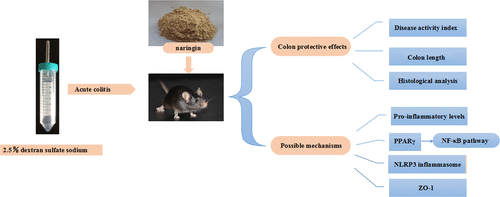当前位置:
X-MOL 学术
›
J. Agric. Food Chem.
›
论文详情
Our official English website, www.x-mol.net, welcomes your
feedback! (Note: you will need to create a separate account there.)
Protective Effect of Naringin on DSS-Induced Ulcerative Colitis in Mice
Journal of Agricultural and Food Chemistry ( IF 5.7 ) Pub Date : 2018-11-26 00:00:00 , DOI: 10.1021/acs.jafc.8b03942 Hongyang Cao 1 , Jiuxi Liu 1 , Peng Shen 1 , Jiapei Cai 1 , Yuchang Han 1 , Kunpeng Zhu 1 , Yunhe Fu 1 , Naisheng Zhang 1 , Zecai Zhang 1, 2 , Yongguo Cao 1
Journal of Agricultural and Food Chemistry ( IF 5.7 ) Pub Date : 2018-11-26 00:00:00 , DOI: 10.1021/acs.jafc.8b03942 Hongyang Cao 1 , Jiuxi Liu 1 , Peng Shen 1 , Jiapei Cai 1 , Yuchang Han 1 , Kunpeng Zhu 1 , Yunhe Fu 1 , Naisheng Zhang 1 , Zecai Zhang 1, 2 , Yongguo Cao 1
Affiliation

|
Peroxisome proliferator-activated receptor γ (PPARγ) is an important member of the nuclear receptor superfamily. Previous studies have shown the satisfactory anti-inflammatory role of PPARγ in experimental colitis models, mainly through negatively regulating several transcription factors such as nuclear factor-κB (NF-κB). Therefore, regulating PPARγ and PPARγ-related pathways has great promise for treating ulcerative colitis (UC). In the present study, our objective was to explore the potential effect of naringin on dextran sulfate sodium (DSS) induced UC in mice and its involved potential mechanism. We found that naringin significantly relieved DSS-induced disease activities index (DAI), colon length shortening, and colonic pathological damage. Exploration of the potential mechanisms demonstrated that naringin significantly activated DSS-induced PPARγ and subsequently suppressed NF-κB activation. PPARγ inhibitor GW9662 largely abrogated the roles of naringin in vitro. Moreover, DSS induced the activation of mitogen-activated protein kinase (MAPK) and (NOD)-like receptor family pyrin domain containing 3 (NLRP3) inflammasome was inhibited by naringin. Tight junction (TJ) architecture in naringin groups was also maintained by regulating zonula occludens-1 (ZO-1) expression. These results suggested that naringin may be a potential natural agent for protecting mice from DSS-induced UC.
中文翻译:

柚皮苷对DSS诱导的小鼠溃疡性结肠炎的保护作用
过氧化物酶体增殖物激活受体γ(PPARγ)是核受体超家族的重要成员。先前的研究表明,PPARγ在实验性结肠炎模型中具有令人满意的抗炎作用,主要是通过负调控几种转录因子,例如核因子-κB(NF-κB)来实现的。因此,调节PPARγ和与PPARγ相关的途径对于治疗溃疡性结肠炎(UC)具有广阔的前景。在本研究中,我们的目的是探讨柚皮苷对小鼠右旋糖酐硫酸钠(DSS)诱导的UC的潜在作用及其潜在的机制。我们发现,柚皮苷可显着缓解DSS诱导的疾病活动指数(DAI),结肠长度缩短和结肠病理损伤。对潜在机制的探索表明,柚皮苷显着激活了DSS诱导的PPARγ,并随后抑制了NF-κB的激活。PPARγ抑制剂GW9662在很大程度上取消了柚皮苷的作用。而且,DSS诱导了丝裂原活化蛋白激酶(MAPK)的活化,而含有3(NLRP3)炎性小体的(NOD)样受体家族吡喃结构域被柚皮苷抑制。柚皮苷组中的紧密连接(TJ)结构也通过调节小带闭塞1(ZO-1)表达来维持。这些结果表明,柚皮苷可能是保护小鼠免受DSS诱导的UC侵害的潜在天然药物。DSS诱导丝裂原活化蛋白激酶(MAPK)和(NOD)样受体家族含有3个(NLRP3)炎性小体的吡啶结构域的激活被柚皮苷抑制。柚皮苷组中的紧密连接(TJ)结构也通过调节小带闭塞1(ZO-1)表达来维持。这些结果表明,柚皮苷可能是保护小鼠免受DSS诱导的UC侵害的潜在天然药物。DSS诱导丝裂原活化蛋白激酶(MAPK)和(NOD)样受体家族含有3个(NLRP3)炎性小体的吡啶结构域的激活被柚皮苷抑制。柚皮苷组中的紧密连接(TJ)结构也通过调节小带闭塞1(ZO-1)表达来维持。这些结果表明,柚皮苷可能是保护小鼠免受DSS诱导的UC侵害的潜在天然药物。
更新日期:2018-11-26
中文翻译:

柚皮苷对DSS诱导的小鼠溃疡性结肠炎的保护作用
过氧化物酶体增殖物激活受体γ(PPARγ)是核受体超家族的重要成员。先前的研究表明,PPARγ在实验性结肠炎模型中具有令人满意的抗炎作用,主要是通过负调控几种转录因子,例如核因子-κB(NF-κB)来实现的。因此,调节PPARγ和与PPARγ相关的途径对于治疗溃疡性结肠炎(UC)具有广阔的前景。在本研究中,我们的目的是探讨柚皮苷对小鼠右旋糖酐硫酸钠(DSS)诱导的UC的潜在作用及其潜在的机制。我们发现,柚皮苷可显着缓解DSS诱导的疾病活动指数(DAI),结肠长度缩短和结肠病理损伤。对潜在机制的探索表明,柚皮苷显着激活了DSS诱导的PPARγ,并随后抑制了NF-κB的激活。PPARγ抑制剂GW9662在很大程度上取消了柚皮苷的作用。而且,DSS诱导了丝裂原活化蛋白激酶(MAPK)的活化,而含有3(NLRP3)炎性小体的(NOD)样受体家族吡喃结构域被柚皮苷抑制。柚皮苷组中的紧密连接(TJ)结构也通过调节小带闭塞1(ZO-1)表达来维持。这些结果表明,柚皮苷可能是保护小鼠免受DSS诱导的UC侵害的潜在天然药物。DSS诱导丝裂原活化蛋白激酶(MAPK)和(NOD)样受体家族含有3个(NLRP3)炎性小体的吡啶结构域的激活被柚皮苷抑制。柚皮苷组中的紧密连接(TJ)结构也通过调节小带闭塞1(ZO-1)表达来维持。这些结果表明,柚皮苷可能是保护小鼠免受DSS诱导的UC侵害的潜在天然药物。DSS诱导丝裂原活化蛋白激酶(MAPK)和(NOD)样受体家族含有3个(NLRP3)炎性小体的吡啶结构域的激活被柚皮苷抑制。柚皮苷组中的紧密连接(TJ)结构也通过调节小带闭塞1(ZO-1)表达来维持。这些结果表明,柚皮苷可能是保护小鼠免受DSS诱导的UC侵害的潜在天然药物。











































 京公网安备 11010802027423号
京公网安备 11010802027423号